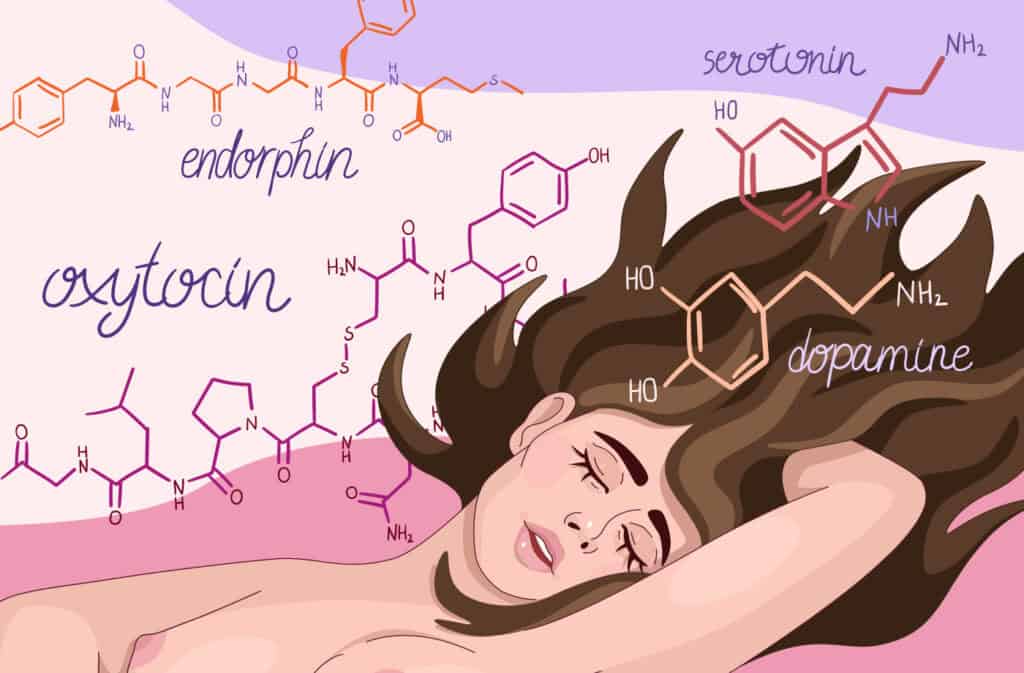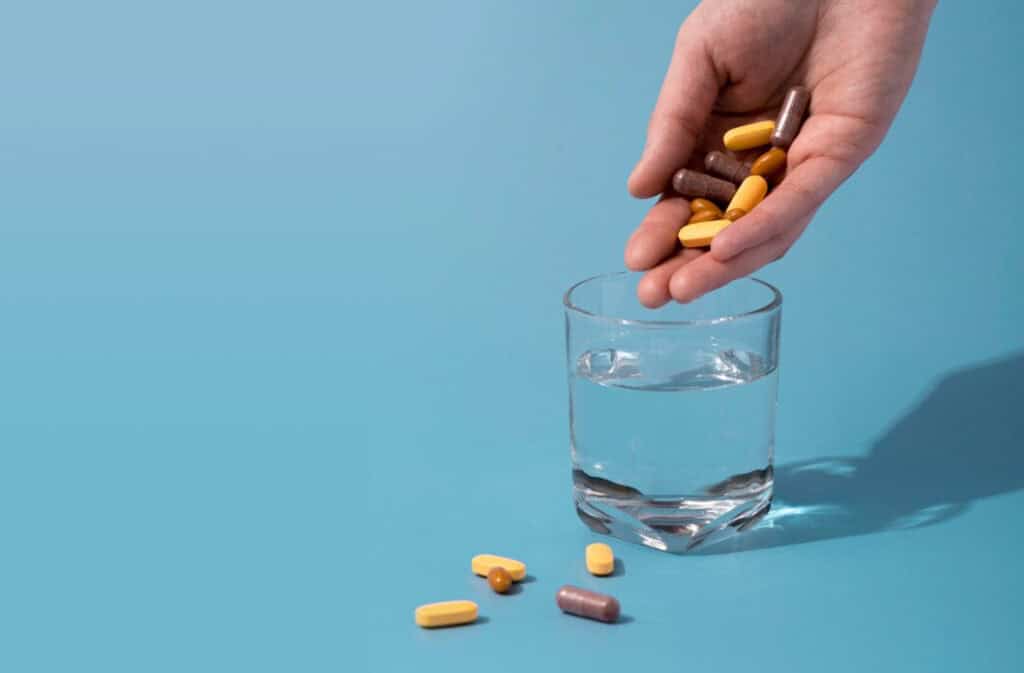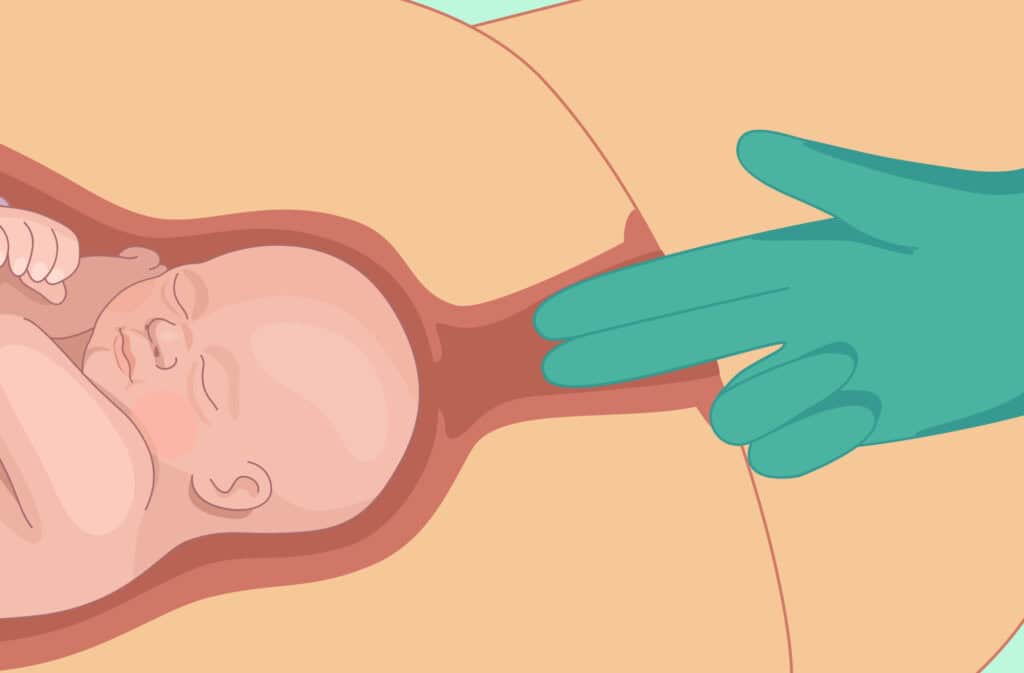Femia > Health Library > Your cycle > Sex > What hormone is released during orgasm? The science of pleasure
What hormone is released during orgasm? The science of pleasure

- Updated Feb 11, 2025
- Published
CRAFTED BY HUMAN
Crafted by human At Femia, we provide accurate and up-to-date information at every stage of your journey, from trying to conceive, pregnancy and postnatal support. All content is created by a real person based on in-depth research and own professional experience. Femia ensures that you will receive expert advice, strict accuracy and a personalized approach from our authors/medical experts. Learn more about our editorial policy.
FACT CHECKED
Fact checked At Femia Health, we maintain the highest standards of editorial excellence in delivering content focused on helping you conceive, guiding you through pregnancy, and supporting you postpartum. Explore our content review principles to learn how we ensure the accuracy and quality of our health and lifestyle tips for every stage of your journey.
- An orgasm occurs at the peak of sexual arousal. Though the sensations of orgasm are felt in the body, usually in your genital area, the brain plays an important role in your orgasm response.
- During sexual arousal and orgasm, the brain releases hormones, including oxytocin, dopamine, and endorphins. These hormones create feelings of pleasure, connection, and satisfaction.
When they think of an orgasm, many people don’t imagine that the brain plays a major role. However, it does.
Your brain releases feel-good hormones during orgasm that bring a variety of benefits, including improved mood, and a stronger relationship with your partner. This guide’ll answer questions like, “Is dopamine released during sex?” We’ll also go into great detail about your brain’s response to the big O. You’ll learn more about the brain’s role in orgasm, the hormones released, and the benefits they bring.
Femia helps millions of women understand their bodies better
What is an orgasm?
An orgasm is the peak of sexual arousal. It usually occurs at the end of sex, though it can occur during foreplay or other times of sexual tension. Some people also experience orgasm during non-sexual activities such as workouts at the gym.
You may know what an orgasm feels like, but may not know the science of what happens during orgasm. At the time of orgasm, the muscles around your genitals rhythmically contract, leading to a feeling of intense pleasure. An orgasm can have a kind of pulsing pleasure. Hormones play a key role in orgasms, with the release of certain orgasm hormones encouraging connection and bonding.
👉Find out more: What is precum and can it cause pregnancy? Understanding pre-ejaculatory fluid
What happens to your body when you orgasm?
During arousal, your vagina secretes vaginal fluid to lubricate it for sex. During orgasm, the muscles around your genitals and anal area contract. You may feel this as a throbbing or contracting sensation in your genitals. Your heart rate and blood pressure may increase, and you may breathe faster than usual.
Men typically ejaculate during orgasm, while women may also experience fluid release, also known as squirting, though it is less common. The release of fluid from the paraurethral glands (located near the urethra), often referred to as female ejaculation, is considered a more precise medical term by some researchers, as it more accurately describes the anatomical source of the fluid. According to a 2024 study published in The Journal of Sex Research, forty percent of women surveyed had experienced squirting. However, these figures can vary across different studies, and the topic of squirting remains highly debated and under ongoing research.
The hormones released during orgasm create feelings of intimacy and bonding. These endorphins can also make you feel relaxed and sleepy following sex. Some people can return to the orgasmic state again quickly, while others find their genitals are too sensitive after an orgasm, or the sexual desire has been fully sated.
What happens in your brain when you orgasm?
While many think of an orgasm as something that happens in your genitals, the brain plays an active role in this sexual response. During orgasm, the brain produces chemicals and neurotransmitters associated with pleasure and bonding.
Different areas of the brain are stimulated during arousal and orgasm, including the areas linked to pleasure and emotion. Brain activity increases during arousal and peaks during orgasm, highlighting the importance of the neurological aspect of orgasm. The hormones released by the brain during orgasm help to create the euphoric feeling associated with orgasm.
Why do orgasms feel good?
The release of endorphins and dopamine makes you feel good. From an evolutionary perspective, the hormones released during orgasm encourage bonding and intimacy. In terms of biology, orgasms may encourage further sexual interactions and increase the chance of reproduction.
What hormones are released during orgasm?
While you’re busy enjoying yourself, your brain is creating a cocktail of hormones and neurotransmitters as part of your pleasure response. These hormones include:
- Dopamine. Dopamine is the feel-good reward hormone associated with addiction. You may experience a surge of dopamine when gambling, eating chocolate, or receiving likes on social media. Dopamine is the more-ish hormone that leaves us wanting more.
- Oxytocin. You’ve probably heard of oxytocin, the ‘love hormone.’ Oxytocin encourages bonding and connection. It plays a vital role in romantic relationships, childbirth, and breastfeeding.
- Endorphins: Act as natural painkillers and mood elevators. Endorphins are feel-good hormones that boost your mood, provide natural pain relief, and improve your emotional health.
- Prolactin. Prolactin creates feelings of relaxation and contentment after orgasm. If you feel sleepy after orgasm, this is likely the prolactin at work.
- Serotonin. Serotonin helps to regulate your mood and is often referred to as a ‘feel good chemical.’ This hormone can also cause drowsiness and relaxation, so it could work with the prolactin to make you want a nap after sex.
Hormones released during orgasm: Men vs. women
The rather misogynistic belief that women can’t have sex without getting attached actually may have some basis in fact at the level of hormonal responses during orgasm. Oxytocin, the love hormone, encourages bonding and connection. Women release lots of this during orgasm, whereas men produce smaller amounts.
Both men and women produce prolactin. According to a 2016 study published in Endocrine, the amount produced correlates with orgasm quality and sexual satisfaction. However, this correlation doesn’t definitively prove that higher prolactin levels always indicate a “better” orgasm. So if you feel sleepy after sex, it may be a sign of a quality orgasm, but it’s not a guaranteed measure.
Benefits of orgasms: More than just pleasure
While an orgasm may be just a few seconds of pleasure, the impacts can be long-lasting. There are lots of benefits to having a high sex drive. The benefits of regular orgasms include:
Improved mental health
The hormones released during orgasm are known to improve your mood, increase feelings of happiness and contentment, and generally make you feel good.
Improved physical health
Regular orgasms can improve your immune system. A 2021 study published in Fertility and Sterility found that people having sex more than three times a month were less likely to catch COVID-19 and more likely to have only mild symptoms when infected with it.
Regular orgasms are also known to support heart health, strengthen the pelvic floor, and reduce pain. Orgasms are a great way to alleviate menstrual cramps, too.
Improved relationship
The oxytocin released during orgasm can improve bonding and encourage connection. Regular orgasms can strengthen your relationship and promote intimacy and connection. A 2015 study published in the Archives of Sexual Behavior found that sexual satisfaction correlated with relationship happiness, suggesting that sexual satisfaction plays a crucial role in overall relationship health.
👉Find out more: Erogenous zones: A guide to pleasure points for women
Side effects of orgasm: What to expect
You may notice you feel less stressed and in a better mood after an orgasm. Most people feel more relaxed due to the hormones released during orgasm, and if you have sex at bedtime, you might sleep better because of these relaxing effects. However, it’s important to acknowledge that individual experiences vary, and some people may experience anxiety or other emotional responses after orgasm.
Some women experience flushed skin after orgasm, where the skin on their chest and face appears blushed. Other women experience headaches after sexual activity due to blood pressure changes during arousal. If you had vigorous sex, you may also experience muscle soreness afterward. While this is possible, it’s crucial to distinguish between headaches caused by sexual activity and other underlying medical conditions.
What happens when you cum? Debunking myths
There are lots of myths circulating about what happens when you have an orgasm, including:
Myth: That sex isn’t enjoyable if you don’t orgasm
Fact: Orgasm occurs at the peak of sexual arousal, and releases the sexual tension built up during arousal and foreplay. Without orgasm, you can still enjoy the arousal and sexual tension building up. While you may not get the release, you can still be sexually satisfied without reaching orgasm.
Myth: That vaginal orgasms are better
Fact: Not all women experience vaginal orgasms. A clitoral orgasm occurs after clitoral stimulation, whereas a vaginal orgasm occurs without clitoral stimulation. A 2018 survey published in the Journal of Sex and Marital Therapy included 1,000 women in the US and found that a third required clitoral stimulation to orgasm.
Not every orgasm is the same, and many women find their experience of orgasms changes over their lifetimes. Some women find clitoral stimulation necessary to orgasm. It’s possible to enjoy intense sensations without vaginal orgasm.
Myth: That it’s easy to reach orgasm
Fact: Sometimes, you may orgasm quickly and without much prelude, and other times it may feel more like a marathon. There’s no one-size-fits-all when it comes to time and technique to achieve orgasm. The key is to enjoy what you’re doing and let the sexual tension build.
Questions from the Femia community
Can orgasms boost my fertility?
While a 2016 study found that uterine contractions during female orgasm increased the amount of sperm retained after sex, which could potentially help sperm reach the egg, the evidence remains limited. The connection between orgasm and fertility is not fully proven, and while it may have a slight positive effect on fertility, it is not a guaranteed factor for improving or increasing the chances of conception. More significant factors, such as sperm quality and the timing of intercourse, play a much more important role in conception.
Do orgasms feel different as I age?
Yes, the hormonal changes as you approach menopause can reduce the intensity of your orgasm. However, some women report enjoying sex more as they age, which may have to do with finding a sense of liberation and acceptance of themselves.
Why do I experience headaches during or after orgasm?
Orgasmic headaches occur during sexual activity. They may be connected to increasing blood pressure during arousal or tension in the head and neck. While this may be normal for you, it’s always worth checking in with your doctor to rule out underlying health conditions.
Can orgasms affect the immune system?
Yes, the number of white blood cells in your body increases after orgasm, boosting your immune system.
Is it possible to have an orgasm without physical stimulation?
Yes, some individuals experience orgasms without physical stimulation. These can occur during mental or emotional stimulation, such as fantasies or meditation. It’s also possible to experience orgasm during non-sexual physical stimulation, such as a coregasm when working out at the gym.
The bottom line
Orgasm occurs at the peak of sexual arousal. The brain plays a vital role in orgasm, by producing a complex hormonal and neurological response. The feelings of pleasure, intimacy, and relaxation experienced during and after orgasm are a result of this brain response.
You don’t need to orgasm to enjoy sex. Some orgasms are big mind-blowing whole-body events and others may be on the smaller side. Whether it’s the best orgasm you’ve ever had or simply a pleasant way to while away the time, orgasms can improve your health and strengthen your relationship.
Orgasms can be achieved through sex or masturbation, and it doesn’t matter if you want to enjoy the hormonal benefits of orgasm. Regular orgasms bring many benefits, so whether you achieve them alone or with others, embrace a healthy, judgment-free attitude to sexual wellness and orgasm.
References
- Fisher WA, et al. Individual and Partner Correlates of Sexual Satisfaction and Relationship Happiness in Midlife Couples: Dyadic Analysis of the International Survey of Relationships. Arch Sex Behav. 2015 Aug;44(6):1609-20. doi: 10.1007/s10508-014-0426-8. Epub 2014 Nov 5. PMID: 25370356. https://pubmed.ncbi.nlm.nih.gov/25370356/.
- Herbenick D, et al. Women’s Experiences With Genital Touching, Sexual Pleasure, and Orgasm: Results From a U.S. Probability Sample of Women Ages 18 to 94. J Sex Marital Ther. 2018 Feb 17;44(2):201-212. doi: 10.1080/0092623X.2017.1346530. Epub 2017 Aug 9. PMID: 28678639. https://pubmed.ncbi.nlm.nih.gov/28678639/.
- Hensel, D. J.,et al. (2023). Vaginal Squirting: Experiences, Discoveries, and Strategies in a U.S. Probability Sample of Women Ages 18-93. The Journal of Sex Research, 61(4), 529–539. https://www.tandfonline.com/doi/full/10.1080/00224499.2023.2243939.
- King R, Dempsey M, Valentine KA. Measuring sperm backflow following female orgasm: a new method. Socioaffect Neurosci Psychol. 2016 Oct 25;6:31927. doi: 10.3402/snp.v6.31927. PMID: 27799082; PMCID: PMC5087695. https://pmc.ncbi.nlm.nih.gov/articles/PMC5087695/.
- Krysiak R, et al. Sexual function and depressive symptoms in young women with elevated macroprolactin content: a pilot study. Endocrine. 2016 Jul;53(1):291-8. doi: 10.1007/s12020-016-0898-5. Epub 2016 Feb 22. PMID: 26902871; PMCID: PMC4901097. https://pmc.ncbi.nlm.nih.gov/articles/PMC4901097.
- Ramadhan MA, et al. The effects of sexual frequency and immune boosting mineral intake on immune status in COVID-10 susceptible individuals. Fertil Steril. 2021 Sep;116(3):e113. doi: 10.1016/j.fertnstert.2021.07.316. Epub 2021 Sep 17. PMCID: PMC8446874. https://pmc.ncbi.nlm.nih.gov/articles/PMC8446874/.
- Wise NJ, Frangos E, Komisaruk BR. Brain Activity Unique to Orgasm in Women: An fMRI Analysis. J Sex Med. 2017 Nov;14(11):1380-1391. doi: 10.1016/j.jsxm.2017.08.014. Epub 2017 Oct 3. PMID: 28986148; PMCID: PMC5675825. https://pmc.ncbi.nlm.nih.gov/articles/PMC5675825.

Learn how PCOS supplements such as inositol, omega-3, and folic acid can help manage your PCOS symptoms and improve fertility.

Discover how to recognize the signs and stages of a real dilated cervix in pregnancy, what to expect at different stages, and when to consult your healthcare provider.

Around a third of new mothers experience postpartum night sweats. Find out how long night sweats last postpartum and how to manage this symptom.

